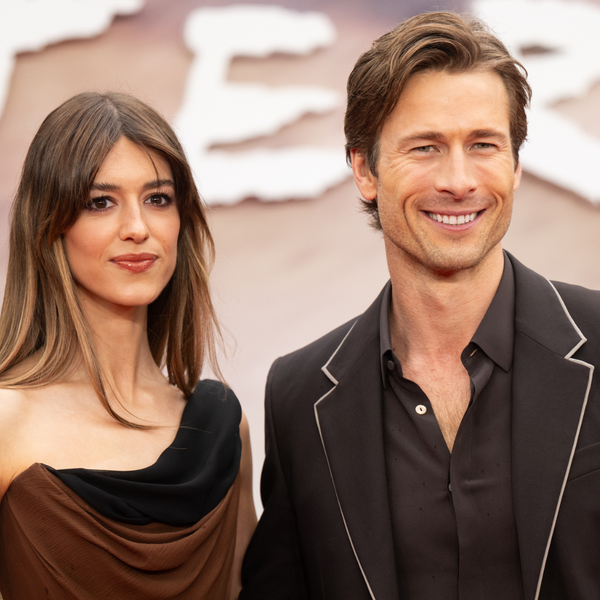
If you haven’t seen Twisters, Lee Isaac Chung’s loosely related sequel to the 1996 film starring Bill Paxton and Helen Hunt, you should stop reading this and change that – and, specifically, see it in 4DX, because the gimmicky movie/ride combo will never get better than watching hot people chase tornadoes while getting tossed in your seat and battered by wind.
If you have seen the heartland disaster flick that’s rejuvenating the adult box office (it made over $80m in the US over the weekend), then you likely have some pressing questions: is there reliably a tornado every day in Oklahoma? Can you really kill a twister with what appears to be barrels of laundry detergent? Where is Glen Powell’s dog, Brisket? And most pressing: why don’t Tyler Owens and Kate Carter, the two hot-for-storms protagonists played by Powell and Daisy Edgar-Jones, kiss at the end?
Somewhere on the cutting room floor, there is a version where they do, after Tyler drills his pick-up – Twisters is, among other things, propaganda for tricked-out trucks – into the airport drop-off lane and chases Kate inside; behind-the-scenes footage of the scene has been circulating on social media among similarly disappointed viewers. But for a few vague and unconfirmed reasons, it did not make it into the movie, despite a light make-out being the eminently reasonable conclusion for two beautiful, flirtatious characters who barely survived half a dozen tornadoes in as many days, in a summer blockbuster whose implicit pitch was “we’re in climate change hell, but have fun!”
always remember what they took from us https://t.co/bnZaDe9eJV pic.twitter.com/YYzsalplza
— Sarah | glen powell summer 🌪️ (@sydglenx) July 20, 2024
According to Powell and Edgar-Jones, the note to cut the kiss came from none other than Steven Spielberg, a producer on the film who isn’t exactly known for his romantic scenes. “I think it stops the film feeling too cliched, actually,” Edgar-Jones told Collider. “I think there’s something really wonderful about it feeling like there’s a continuation. This isn’t the end of their story. They’re united by their shared passion for something.”
Powell, the ascendant movie star of the moment, credited Spielberg’s decision to, essentially, message Kate’s ambition over love. “It’s returning Kate to the thing that she loves, which is storm chasing. So that’s what you have at the end of the movie,” he said. “They share this thing, and her passion is reinvigorated, and her sense of home is reinvigorated. I feel like a kiss would be sort of unrepresentative of the right goal at the end of the movie. And it is a good Spielberg note. It’s why that kid is still in this game.”
Chung, speaking to Entertainment Weekly, said the no-kiss take was simply a “better” conclusion. “If it ends on the kiss, then it makes it seem as though that’s what Kate’s journey was all about, to end up with a kiss,” he added. “But instead, it’s better that it ends with her being able to continue doing what she’s doing with a smile on her face.”
With all due respect to everyone involved in the best theatrical experience of my year: no. why not both? Can a woman not have it all? Would having a little sexual payoff in this movie of competing pressure systems, in this summer of dismal forecasts, really detract from the character’s independence? Is this what we have gained from the call for strong independent female characters?
I kid – Twisters is a fun movie, not to be taken too seriously – but that’s also part of the point. For there is a larger, more amorphous cause for the kiss cut: most Hollywood blockbusters don’t bother with it any more. Twisters is a classic case of what the critic RS Benedict called the “everyone is beautiful and no one is horny” blockbuster phenomenon, in which performers present increasingly unattainable, fetishized physical ideals – rippling abs, flawless skin, surgically enhanced curves – devoid of carnality. (This is, to date, also a descriptor for Glen Powell’s charisma, and I look forward to being proved wrong.)
The de-sexing of the blockbuster owes to several reasons: the rise of superhero films; the financial pressure to appeal to as many people as possible, including children and international censors; a longstanding slide toward big-screen sexlessness that has lowered expectations among younger viewers – something Chung alluded to with a comment about test audiences responding tepidly to a Twisters kiss. “I feel like audiences are in a different place now in terms of wanting a kiss or not wanting a kiss,” he said. “I actually tried the kiss, and it was very polarizing – and it’s not because of their performance of the kiss.” Attempts to bring sexy back to the big screen this year, from Challengers to Hit Man to the early summer box office disappointment The Fall Guy, have largely under-delivered on that hook, the buzz for Challengers among the very online notwithstanding.
I’m hesitant to blame gen Z on principal, as studies have found they don’t necessarily want less PDA or romance on screen, just more nuanced and less inevitable versions of it. Which the frustrating part about the final version of Twisters: cutting the kiss did not feel like subverting expectations. It felt like a cop-out and a let-down – inadequate payoff to time and the tension built by the performers, the CGI twisters and the characters’ survival. It was only a kiss – put it in the sequel, and please also put that sequel in 4DX.










